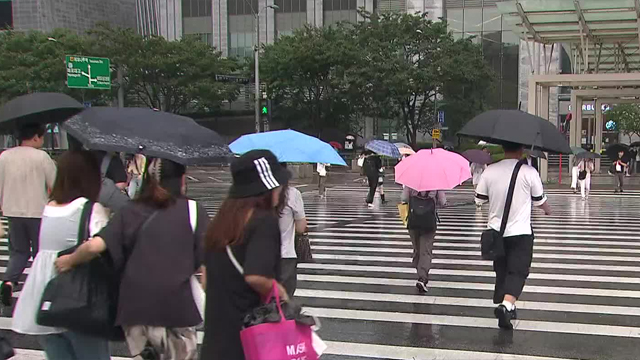[Anchor]
Today (July 8), temperatures in many areas, including Seoul, exceeded normal body temperature.
Medical specialist Park Kwang-sik explains what effects temperatures higher than body temperature have on the human body.
[Report]
Yesterday afternoon (July 7), a Vietnamese male worker in his 20s was found dead while seated at a construction site in Gumi, North Gyeongsang Province.
Typically, when heatstroke patients are brought to the emergency room, their body temperature exceeds 40 degrees, just like in the case of the Vietnamese worker.
Cold fluids are injected into the bloodstream, and ice packs are applied to forcibly lower the body temperature.
[Park Sung-jun/Professor of Emergency Medicine at Korea University Guro Hospital: "Heatstroke is a dangerous condition that can be life-threatening. A high fever can impair brain function, leading to symptoms such as auditory or visual hallucinations, or altered consciousness."]
The human body maintains a temperature around 36.5 degrees, When temperatures rise, the body tries to cool itself by sweating and dilating blood vessels near the skin to release heat from the body.
However, if the external temperature is higher than body temperature, heat can actually enter the body from the environment.
This effect worsens when humidity is high, as sweating becomes less effective, making it harder to regulate body temperature.
When body temperature approaches 40 degrees, the risk of fainting increases significantly.
If it rises above 41 degrees, organs such as the brain and heart may suffer damage, potentially leading to death.
[Na Seung-woon/Professor at the Cardiovascular Center of Korea University Guro Hospital: "When body temperature rises, blood vessels dilate and the heart rate increases, causing blood pressure to fluctuate. This raises the risk of cardiovascular complications."]
So far this year, nearly 1,000 people have been treated for heat-related illnesses, more than double the number from the same period last year.
Avoiding prolonged exposure to extreme heat is essential to prevent heat-related conditions.
This is KBS News, Park Kwang-sik reporting.
Today (July 8), temperatures in many areas, including Seoul, exceeded normal body temperature.
Medical specialist Park Kwang-sik explains what effects temperatures higher than body temperature have on the human body.
[Report]
Yesterday afternoon (July 7), a Vietnamese male worker in his 20s was found dead while seated at a construction site in Gumi, North Gyeongsang Province.
Typically, when heatstroke patients are brought to the emergency room, their body temperature exceeds 40 degrees, just like in the case of the Vietnamese worker.
Cold fluids are injected into the bloodstream, and ice packs are applied to forcibly lower the body temperature.
[Park Sung-jun/Professor of Emergency Medicine at Korea University Guro Hospital: "Heatstroke is a dangerous condition that can be life-threatening. A high fever can impair brain function, leading to symptoms such as auditory or visual hallucinations, or altered consciousness."]
The human body maintains a temperature around 36.5 degrees, When temperatures rise, the body tries to cool itself by sweating and dilating blood vessels near the skin to release heat from the body.
However, if the external temperature is higher than body temperature, heat can actually enter the body from the environment.
This effect worsens when humidity is high, as sweating becomes less effective, making it harder to regulate body temperature.
When body temperature approaches 40 degrees, the risk of fainting increases significantly.
If it rises above 41 degrees, organs such as the brain and heart may suffer damage, potentially leading to death.
[Na Seung-woon/Professor at the Cardiovascular Center of Korea University Guro Hospital: "When body temperature rises, blood vessels dilate and the heart rate increases, causing blood pressure to fluctuate. This raises the risk of cardiovascular complications."]
So far this year, nearly 1,000 people have been treated for heat-related illnesses, more than double the number from the same period last year.
Avoiding prolonged exposure to extreme heat is essential to prevent heat-related conditions.
This is KBS News, Park Kwang-sik reporting.
■ 제보하기
▷ 카카오톡 : 'KBS제보' 검색, 채널 추가
▷ 전화 : 02-781-1234, 4444
▷ 이메일 : kbs1234@kbs.co.kr
▷ 유튜브, 네이버, 카카오에서도 KBS뉴스를 구독해주세요!
- Risks when heat tops body temp
-
- 입력 2025-07-08 23:47:29

[Anchor]
Today (July 8), temperatures in many areas, including Seoul, exceeded normal body temperature.
Medical specialist Park Kwang-sik explains what effects temperatures higher than body temperature have on the human body.
[Report]
Yesterday afternoon (July 7), a Vietnamese male worker in his 20s was found dead while seated at a construction site in Gumi, North Gyeongsang Province.
Typically, when heatstroke patients are brought to the emergency room, their body temperature exceeds 40 degrees, just like in the case of the Vietnamese worker.
Cold fluids are injected into the bloodstream, and ice packs are applied to forcibly lower the body temperature.
[Park Sung-jun/Professor of Emergency Medicine at Korea University Guro Hospital: "Heatstroke is a dangerous condition that can be life-threatening. A high fever can impair brain function, leading to symptoms such as auditory or visual hallucinations, or altered consciousness."]
The human body maintains a temperature around 36.5 degrees, When temperatures rise, the body tries to cool itself by sweating and dilating blood vessels near the skin to release heat from the body.
However, if the external temperature is higher than body temperature, heat can actually enter the body from the environment.
This effect worsens when humidity is high, as sweating becomes less effective, making it harder to regulate body temperature.
When body temperature approaches 40 degrees, the risk of fainting increases significantly.
If it rises above 41 degrees, organs such as the brain and heart may suffer damage, potentially leading to death.
[Na Seung-woon/Professor at the Cardiovascular Center of Korea University Guro Hospital: "When body temperature rises, blood vessels dilate and the heart rate increases, causing blood pressure to fluctuate. This raises the risk of cardiovascular complications."]
So far this year, nearly 1,000 people have been treated for heat-related illnesses, more than double the number from the same period last year.
Avoiding prolonged exposure to extreme heat is essential to prevent heat-related conditions.
This is KBS News, Park Kwang-sik reporting.
Today (July 8), temperatures in many areas, including Seoul, exceeded normal body temperature.
Medical specialist Park Kwang-sik explains what effects temperatures higher than body temperature have on the human body.
[Report]
Yesterday afternoon (July 7), a Vietnamese male worker in his 20s was found dead while seated at a construction site in Gumi, North Gyeongsang Province.
Typically, when heatstroke patients are brought to the emergency room, their body temperature exceeds 40 degrees, just like in the case of the Vietnamese worker.
Cold fluids are injected into the bloodstream, and ice packs are applied to forcibly lower the body temperature.
[Park Sung-jun/Professor of Emergency Medicine at Korea University Guro Hospital: "Heatstroke is a dangerous condition that can be life-threatening. A high fever can impair brain function, leading to symptoms such as auditory or visual hallucinations, or altered consciousness."]
The human body maintains a temperature around 36.5 degrees, When temperatures rise, the body tries to cool itself by sweating and dilating blood vessels near the skin to release heat from the body.
However, if the external temperature is higher than body temperature, heat can actually enter the body from the environment.
This effect worsens when humidity is high, as sweating becomes less effective, making it harder to regulate body temperature.
When body temperature approaches 40 degrees, the risk of fainting increases significantly.
If it rises above 41 degrees, organs such as the brain and heart may suffer damage, potentially leading to death.
[Na Seung-woon/Professor at the Cardiovascular Center of Korea University Guro Hospital: "When body temperature rises, blood vessels dilate and the heart rate increases, causing blood pressure to fluctuate. This raises the risk of cardiovascular complications."]
So far this year, nearly 1,000 people have been treated for heat-related illnesses, more than double the number from the same period last year.
Avoiding prolonged exposure to extreme heat is essential to prevent heat-related conditions.
This is KBS News, Park Kwang-sik reporting.
-
-

박광식 기자 doctor@kbs.co.kr
박광식 기자의 기사 모음
-
이 기사가 좋으셨다면
-
좋아요
0
-
응원해요
0
-
후속 원해요
0















이 기사에 대한 의견을 남겨주세요.